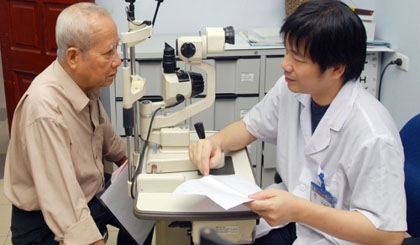Actively adapting to population aging
A rapid ageing population, due to the increasing number of elderly citizens both in number and proportion compared to the total population, is a scenario which inevitably occurs in most developing countries, including Vietnam.
 |
| An elderly citizen undergoes an eye check-up at the Hospital of Post and Telecoms, Hanoi. (Credit: NDO) |
The number of elderly people in Vietnam is increasing rapidly and the nation officially entered the aging stage in 2011, faster than the previous forecast (in 2017). Vietnam is listed as one among ten countries with the highest aging population ratio in the world.
At the current pace, Vietnam only needs about 20 years to convert from an aging population to an aged one. It is forecast that, under the medium variant, by 2049 the elderly (60 years or older) in the country will exceed 27% of the population with more than 30 million people out of a total population of 113 million.
The rapid increase in proportion and number of elderly people is a significant achievement, thanks to the successful implementation of relevant programmes on family planning, people's healthcare, socio-economic development and the improvement of people’s quality of life. However, the aging population for a country with a low socio-economic development level such as Vietnam is a huge challenge for numerous reasons.
Population aging is inevitable, therefore, being aware of the process and developing proper plans to adapt to it is crucial. Lessons learnt from countries that have experienced the aging process prior to Vietnam show that the most suitable adaptation to it is by implementing a strategy of the "aging initiative" to lay a basis for "successful aging".
The "aging initiative" is understood simply as an initiative in preparing for this stage on three policy pillars to address issues in economy, healthcare and participation in social activities of the elderly. The aim of the initiative is to utilise the best opportunities from the "golden population structure" to create an increasingly strong economic base in preparation for a society with more and more elderly people.
It also establishes a large-scale social security system with equality between males and females and between workers in the formal sector and those in informal ones, based on their contributions while working and pension enjoyed in their old age.
It is also important to develop and improve the system of social policies to help elderly people without children, or with children but in unconditional support to care for elderly parents. In addition, the "aging initiative" also includes improving the system of healthcare, social and cultural services and building a suitable environment for the elderly.
In addition to treatment and medical care, it is necessary to develop a local support network for the elderly, in which the elderly are centred and surrounded by family members, neighbours, community groups, elderly clubs, and voluntary associations.
(Source: NDO)
 về đầu trang
về đầu trang





